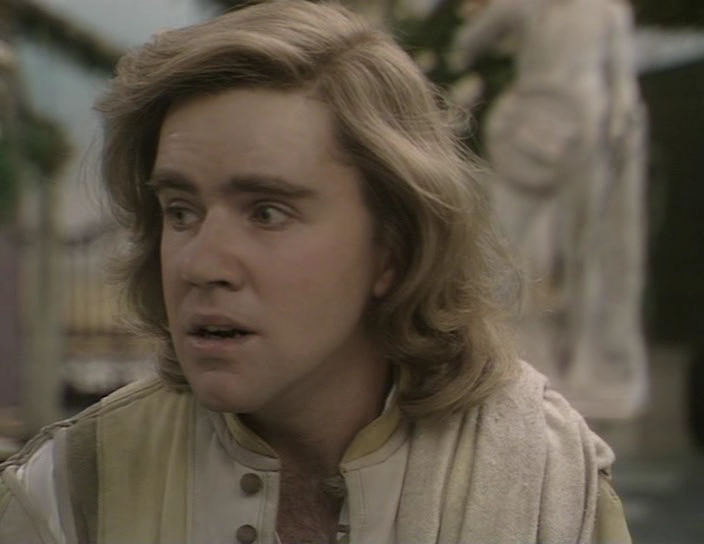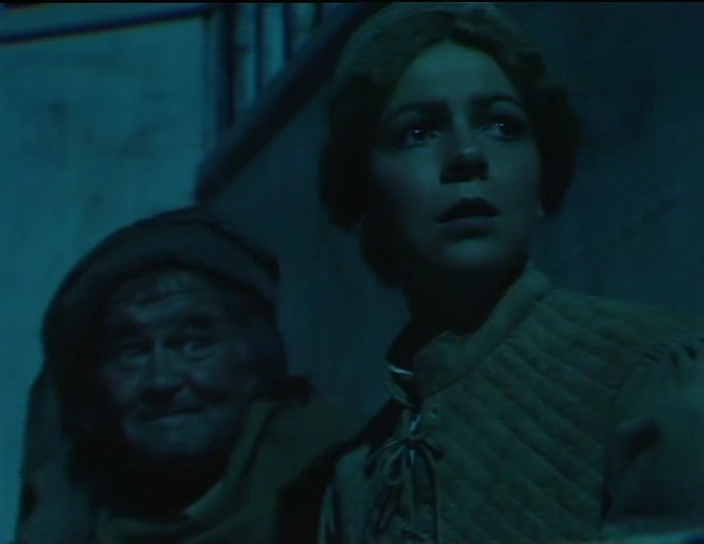

Making its debut with Romeo and Juliet on 3 December 1978, and concluding nearly seven years later with Titus Andronicus on 27 April 1985, the BBC Television Shakespeare project was the single most ambitious attempt at bringing the Bard of Avon to the small screen, both at the time and to date.
Producer Cedric Messina was already an experienced producer of one-off television Shakespeare presentations, and was thus ideally qualified to present the BBC with a daunting but nonetheless enticingly simple proposition: a series of adaptations, staged specifically for television, of all 36 First Folio plays, plus Pericles (The Two Noble Kinsmen was considered primarily John Fletcher's work, and the legitimacy of Edward III was still being debated).
The scale of Messina's proposal, far greater than that of previous multi-part Shakespeare series such as An Age of Kings (BBC, 1960) and Spread of the Eagle (BBC, 1963), required an American partner in order to guarantee access to the US market, deemed essential for the series to recoup its costs. Time-Life Television agreed to participate, but under certain controversial conditions - that the productions be traditional interpretations of the plays in appropriately Shakespearean period costumes and sets, designed to fit a two-and-a-half-hour time slot.
The running-time requirement was swiftly jettisoned when it became clear that the major tragedies in particular would have suffered severely, but other artistic restrictions remained largely in place throughout. Although later productions under Messina's successors Jonathan Miller and Shaun Sutton would be more experimental, Miller was unable to persuade first-choice directors such as Peter Brook and Ingmar Bergman to take part, and Michael Bogdanov resigned from Timon of Athens (eventually tx, 4/16/1981, with Miller himself directing) after his modern-dress interpretation was considered too radical a departure.
This gave the BBC Television Shakespeare cycle the reputation of being overly staid and conventional, which was not always deserved. Though Messina's own productions (1978-80) were largely conservative, Jonathan Miller (1980-82) revamped things both visually (thanks to a design policy of sourcing sets and costumes from great paintings of the era in which the play was set) and in terms of direction and casting, in some cases using popular actors with little or no Shakespeare experience (John Cleese as Petruchio, Bob Hoskins as Iago) to attract new and younger audiences.
Under Miller, directors such as Jack Gold, Jane Howell and Elijah Moshinsky were encouraged to be more adventurous, with Howell in particular adopting such a stylised approach for The Winter's Tale (tx. 8/2/1981) and the Henry VI/Richard III cycle (tx. 2-23/1/1983) that they pushed the definition of "traditional" to the limit, but also garnered the series some of its best reviews. Miller's aesthetic policies continued under Shaun Sutton (1982-85), who brought the project to a belated close.
Whatever its artistic reputation, there was no doubt that the BBC Television Shakespeare was a commercial triumph, breaking even financially by 1982 (ahead of expectations) and fully justifying Messina's gamble. Its success was helped by the rapid growth of video recorders in schools, creating a secondary market that was much bigger than initially predicted - though the initial decision to sell the plays only as a complete set provoked complaints from people who baulked at paying the substantial asking price because they were after a smaller selection or individual titles. The BBC eventually released some of the more popular titles separately, but it was not until late in 2005 that the entire series was available individually on DVD at a competitive price.
Although the BBC Television Shakespeare project as a whole met with a mixed reception, it had several positive virtues. Chief among them was the fact that its completist remit meant that several of the more obscure plays received their first television adaptation, and in most cases the BBC version remains the only one. Happily, such productions as Henry VIII (tx. 25/2/1979), Cymbeline (tx. 10/7/1983), Pericles (tx. 11/6/1984) and Titus Andronicus were considered amongst the cycle's most impressive achievements, with Henry VIII subsequently voted the best production of all by the Shakespeare Association of America.
A complete list of BBC Television Shakespeare productions is as follows:
Series One (producer: Cedric Messina): Romeo and Juliet (tx. 3/12/1978), Richard II (tx. 10/12/1978), As You Like It (tx. 17/12/1978), Julius Caesar (tx. 11/2/1979), Measure For Measure (tx. 18/2/1979), Henry VIII (tx. 25/2/1979)
Series Two (p. Cedric Messina): Henry IV Part One (tx. 9/12/1979), Henry IV Part Two (tx. 16/12/1979), Henry V (tx.23/12/1979), Twelfth Night (tx. 6/1/1980), The Tempest (tx. 27/2/1980), Hamlet (tx. 25/5/1980).
Series Three (p. Jonathan Miller): The Taming of the Shrew (tx. 23/10/1980), The Merchant of Venice (tx. 17/12/1980), All's Well That Ends Well (tx. 4/1/1981), The Winter's Tale (tx. 8/2/1981), Timon of Athens (tx. 16/4/1981), Antony and Cleopatra (tx. 8/5/1981)
Series Four (p. Jonathan Miller): Othello (tx. 4/10/1981), Troilus and Cressida (tx. 7/10/1981), A Midsummer Night's Dream (tx. 13/12/1981)
Series Five (p. Jonathan Miller, Shaun Sutton): King Lear (tx. 19/9/1982), The Merry Wives of Windsor (tx. 28/12/1982), Henry VI Part One (tx. 2/1/1983), Henry VI Part Two (tx. 9/1/1983), Henry VI Part Three (tx. 16/1/1983), Richard III (tx. 23/1/1983), Cymbeline (tx. 10/7/1983)
Series Six (p. Shaun Sutton): Macbeth (tx. 17/10/1983), The Comedy of Errors (tx. 24/12/1983), The Two Gentlemen of Verona (tx. 27/12/1983), Coriolanus (tx. 21/4/1984), Pericles (tx. 11/6/1984)
Series Seven (p. Shaun Sutton): King John (tx. 24/11/1984), Much Ado About Nothing (tx. 30/11/1984), Love's Labour's Lost (tx. 5/1/1985), Titus Andronicus (tx. 27/4/1985)
The BBC also produced Shakespeare in Perspective, an accompanying series of 25-minute personal introductions to individual plays by an eclectic range of presenters from the literary (Anthony Burgess, Dennis Potter, Jilly Cooper) to the scholarly (Germaine Greer, Frank Kermode, Michael Wood) to the celebrity (Roy Hudd, George Melly, Barry Took). These usually took the form of straight-to-camera addresses from assorted locations with some connection to the play, which were intercut with extracts from the accompanying BBC Shakespeare production, usually screened later that evening.
Michael Brooke
For the BBC Television Shakespeare, tx. 27/12/1983, colour, 136 mins
Director Don Taylor
Production Companies BBC Television, Time-Life Television
Producer Shaun Sutton
Script Editor David Snodin
Designer Barbara Gosnold
Music Anthony Rooley, The Consort Of Musicke
Cast: Tyler Butterworth (Proteus), John Hudson (Valentine), Tessa Peake-Jones (Julia), Michael Byrne (Antonio), John Woodnutt (Panthino), Tony Haygarth (Launce)
The romantic complications of various residents of Renaissance Italy, notably the two young gentlemen Proteus and Valentine.

One of Shakespeare's least-performed plays, The Two Gentlemen of Verona has been adapted just once for television, unsurprisingly as part of the BBC Television Shakespeare cycle. Presumably assuming that this would remain the case indefinitely and that audiences would most likely be wholly unfamiliar with it, director Don Taylor wisely opted for a straightforward, no-frills presentation of the text. It's broadly realistic in treatment, despite Barbara Gosnold's stylised Renaissance settings (including a deliberately unrealistic forest) and occasional interventions from gilded cherubs in what Taylor conceived as a 'Garden of Courtly Love' in which the various lovers could have their trysts.

The two gentlemen of the title are neatly contrasted both in appearance and manner. The blond Proteus (Tyler Butterworth) is the more flamboyant of the duo, and the more prone to acting on impulse, while the dark-haired Valentine (John Hudson) is more thoughtful and reflective. This doesn't make the notorious scene where Valentine forgives Proteus for attempting to rape his beloved Silvia much more convincing to present-day audiences, but it does at least supply a token element of psychological realism to one of Shakespeare's most notoriously problematic scenes: Valentine immediately recognises both that Proteus has been living a fantasy and, crucially, that even the merest injection of reality has caused it to collapse irrevocably, rendering him 'harmless'.

The supporting cast is equally impressive, especially Joanne Pearce (Silvia) and Tessa Peake-Jones (Julia), the latter contributing a poignant study in emotional turmoil. Unsurprisingly, in a role originally played by legendary Elizabethan comic Will Kemp, Tony Haygarth's Launce garners most of the laughs, either in partnership with his dog Crab or in conversation with Speed, unconventionally cast here as a precocious boy (Nicholas Kaby). Paul Daneman's Duke Senior is rather more knowing than the text implies, seemingly aware that his daughter Silvia's would-be suitor Thurio (David Collings) is a foppish fool, but content to bless the union nonetheless. The band of forest outlaws is resolutely unthreatening, though there's every likelihood that this was Shakespeare's intention.
Musically, this is one of the more adventurous BBC Shakespeare productions, with early music pioneer Anthony Rooley's arrangements of works by a wide range of the playwright's musical contemporaries - the vast majority of them English, belying the play's Italian setting. A well-timed onscreen performance of one of John Dowland's 'Lachrimae' by Rooley's Consort of Musicke is particularly effective.
Michael Brooke
http://rapidshare.com/files/115063162/The_Two_Gentlemen_of_Verona_BBC.part01.rar
http://rapidshare.com/files/115063836/The_Two_Gentlemen_of_Verona_BBC.part02.rar
http://rapidshare.com/files/115064661/The_Two_Gentlemen_of_Verona_BBC.part03.rar
http://rapidshare.com/files/115065458/The_Two_Gentlemen_of_Verona_BBC.part04.rar
http://rapidshare.com/files/115066205/The_Two_Gentlemen_of_Verona_BBC.part05.rar
http://rapidshare.com/files/115067083/The_Two_Gentlemen_of_Verona_BBC.part06.rar
http://rapidshare.com/files/115067873/The_Two_Gentlemen_of_Verona_BBC.part07.rar
http://rapidshare.com/files/115068679/The_Two_Gentlemen_of_Verona_BBC.part08.rar
http://rapidshare.com/files/115069563/The_Two_Gentlemen_of_Verona_BBC.part09.rar
http://rapidshare.com/files/115070516/The_Two_Gentlemen_of_Verona_BBC.part10.rar
http://rapidshare.com/files/115072185/The_Two_Gentlemen_of_Verona_BBC.part11.rar
http://rapidshare.com/files/115072950/The_Two_Gentlemen_of_Verona_BBC.part12.rar
http://rapidshare.com/files/115073179/The_Two_Gentlemen_of_Verona_BBC.part13.rar
no pass



0 comments:
Post a Comment